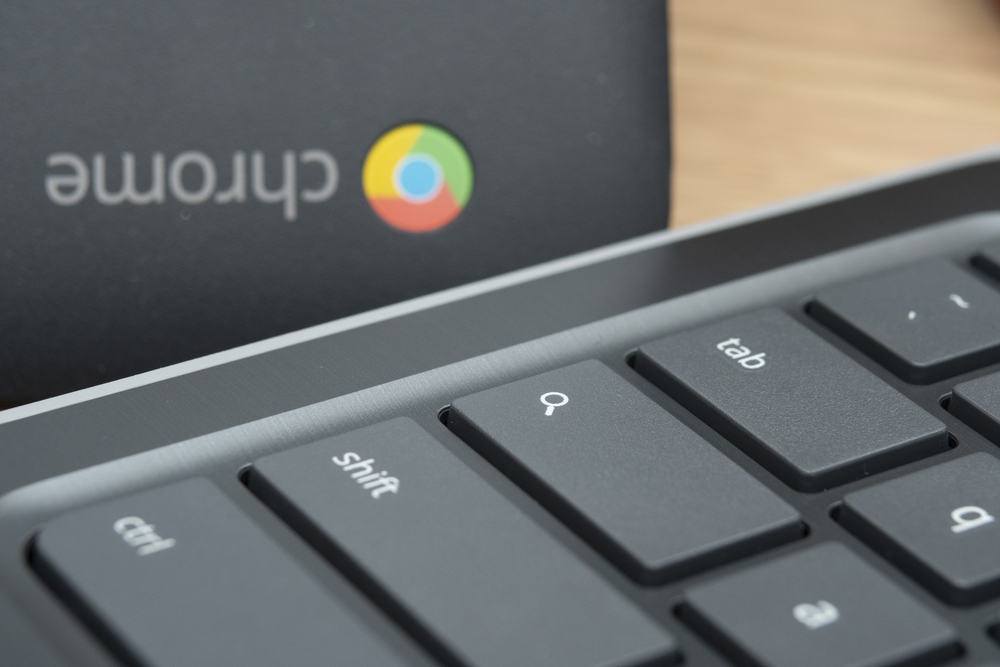One of the best freebies I’ve ever received from a company was a Chromebook. The CR-48 was the first Chromebook offered to the public, and I snagged mine a decade ago as part of the Chrome Notebook Pilot Program. Chromebooks have become a popular, affordable alternative to more expensive Windows and Mac laptops in the years since. Here’s a more in-depth look at modern Chromebooks and if they could make sense for you.

Photo: Deposit Photos
What is a Chromebook?
Chromebooks are laptops running the Google Chrome operating system, which shares a name with the popular Google Chrome web browser. Chromebooks include laptop, desktop and tablet personal computers, powered by the lightweight Chrome OS experience.
Chrome OS supports a large number of apps available in the Google Play Store. Installing an app is similar to adding an app on an Android phone or a plugin to a Chrome browser. In fact, many Chromebooks can run Android apps directly.
In my experience, Chromebooks do a great job of handling tasks you can do from your web browser. That includes email, web browsing, watching videos, document editing, spreadsheets and lightweight gaming. You can still do some of these things while your Chromebook is in offline mode, but it’s definitely an online-first experience.

Photo: Deposit Photos
Can a Chromebook replace a Windows or Mac laptop?
Chromebooks are a good choice for anyone with typical computer needs. For example, if you spend most of your time online in your email, browsing the web, visiting social media and watching videos, a Chromebook can handle your needs just fine.
Apps available for Chromebooks include Google Workspace (Google Docs, Google Sheets, etc.), Microsoft Office (Microsoft Word, Microsoft Excel, etc.), Google Keep, Dropbox, Evernote, Spotify, Netflix, YouTube, Facebook Messenger, Zoom, Adobe Lightroom, Canva and many, many more.
Most Chromebooks use lower-power processors and other components than pricier Windows and Mac computers, which means they may run a tiny bit slower for intensive computing tasks. However, for web browsing and email, you’ll find good battery life and a zippy experience overall if you pick the right Chromebook for your needs.
When I got my first Chromebook, my daily computer was a Windows laptop. These days, I mainly use a Macbook Pro. For my heavy-duty computer needs, where I spend my entire workday online and work heavily with multimedia, a Chromebook isn’t ideal. But for most people, including most Living on the Cheap readers, there’s no reason to shy away from a Chromebook if it fits your budget and needs.
Typical Chromebook pricing
Value-priced Chromebooks start around $200 to $250, though you can find lower-cost models if you’re a bargain hunter. Midrange Chromebooks cost around $300 to $500. High-end Chromebooks, such as the Google Pixelbook Go, cost around $600 to $900. However, Chromebooks regularly appear on the list of Black Friday deals, so you can typically get one for as much as half off these prices if you’re shopping toward the end of the year.
If you’re looking for an everyday laptop to browse the web, shop, use Facebook, and check your email, a budget-priced model around $250 to $350 should handle your needs quite well.
For business users and anyone interested in gaming, you’ll probably want a higher-end version with an upgraded processor, more memory (RAM), a larger hard drive for storage and a high-quality graphics card.
How to pick a Chromebook
To choose a Chromebook, start by understanding your needs in a computer. Knowing how you will use the computer can guide you to the right price point and features for your needs and budget.
For example, if you already have a desktop, a low-cost Chromebook could be a good choice for a travel computer when you’re away from home. But if you’re looking to replace a daily-use laptop, you may want to spend a little more for more power and features.
Budget Chromebooks under $250 may feel a little slow compared to the mid-range. And power users will definitely want to pay more for a top-of-the-line version.
The high-end Pixelbook, Google’s own Chromebook, is developed completely by Google and competes with the Microsoft Surface line of tablet PCs. Pixelbooks are great for Google purists and anyone entrenched in the Google ecosystem, though they come with a higher price tag. Chromebooks at a wide range of price points are also made by many of the same companies that sell Windows-based PCs, including Dell, HP, Samsung, Lenovo, Asus, and Acer.
Is a Chromebook right for you?
If you’ve made it this far through the article, you’ll likely find a Chromebook is a good fit for your needs. They make a great daily computer for typical computing needs and come at a cost that’s often much lower than Windows and Mac alternatives.
If you’re interested in shopping for a Chromebook, you can find one at Amazon, Best Buy, Target, the Google Store, and many other retailers.
If you enjoyed this article, you may also like:

I have a CR-48 at home, and was super excited about it when it arrived. Over time, I found that it is really only a good tool for web based apps. I use Word and Excel constantly, so that was a big snag for me. Also, the old non-desktop version felt rough when saving and moving files around, like images for blogging.
If you’re not very tech inclined and just want it for email and such, though, and will always have internet around, Chrome OS is great.
Chromebooks are not meant to replace laptops. They are not meant to be for every type of user. Like many things in IT (as in life), not every device is meant for everyone or every situation.
Chromebooks are meant for users that spend most of their time in a browser and want a device that starts up fast and is easy to use. That’s a nice sized market.
If you’re considering Chromebooks but also need access to Windows applications you can look at solutions like, Ericom AccessNow an HTML5 RDP client that enables Chromebook users to securely connect to any RDP host, including Terminal Server and VDI virtual desktops, and run their applications and desktops in a browser.
AccessNow does not require any client to be installed on the Chromebook, as you only need the HTML5-compatible browser.
For an online, interactive demo, open your Chrome browser and visit:
http://www.ericom.com/demo_AccessNow.asp?URL_ID=708
Please note that I work for Ericom